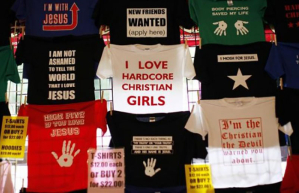
A Kentucky court ruled that a Christian T-shirt company can decline to print messages that run contrary to its religious views. The owner was originally found guilty of discrimination after refusing to print messages related to a gay pride parade.
According to Billy Hallowel of The Blaze, the Lexington-Fayette Urban County Human Rights Commission found Blaine Adamson, the owner of printing company Hands On Originals, guilty of discrimination when he declined to print messages that run in opposition to his religious views. However, the Fayette County Circuit Court overturned that decision, saying that he was within its rights to make such a decision.
"The court rightly recognized that the law protects Blaine's decision not to print shirts with messages that conflict with his beliefs," Alliance Defending Freedom attorney Jim Campbell said in a statement. "No sufficient reason exists for the government to coerce Blaine to act against his conscience in this way. In short, [Hands On Originals'] declination to print the shirts was based upon the message of [Gay and Lesbian Services Organization of Lexington] and the Pride Festival and not on the sexual orientation of its representatives or members."
According to Scott Shackford of Reason, a gay organization filed a complaint against the Christian owner back in 2012, accusing the company of violating public accommodation laws, which prohibited discrimination on the basis of sexual orientation. The company countered by stating that it refused to print messages that run contrary to their beliefs.
"They were not discriminating against gay customers," Shackford wrote. "They were declining to publish statements with which the company disagreed, something they've done several times in the past, according to court documents."
Campbell noted that Adamson has even turned down at least one of the orders from a Christian organization. According to Hallowell, Adamson refused to print T-shirts for them because he thought their "blood design" was too racy for his tastes.
"Blaine's position is that he can't print something if it conflicts with religious convictions," Campbell said. "Over the two years leading up to this case, Hands On Originals had denied at least 13 orders all for the reason [that] they didn't want to print and convey the message they were being asked to convey."
Shackford noticed that the Kentucky case shared similar traits with another one in Colorado, where a Christian man wanted a bakery in that state to make a cake that had an anti-gay message. After the bakery refused to do so, he filed a complaint in an attempt to draw a similarity to Christian bakers who were cited and fined for refusing to make a cake for gay customers.
"The mistake he made was demanding the cakes say something particular. Colorado dismissed his complaint," Shackford wrote. "He was not being discriminated against just for being a Christian. Rather, the bakery could not be compelled to say something it found offensive."
According to Shackford, Judge James Ishmael Jr. pointed out to the Human Rights Commission that their conclusions were "factually incorrect" in respect to federal and state laws as interpreted by the Supreme Court.
"Kentucky does have a religious freedom regulation, and the judge invokes it, along with the precedent recently set by the Burwell v. Hobby Lobby Supreme Court ruling," Shackford wrote. "Ishmael then ordered the decision reversed and all charges against Hands On Originals dismissed."
Adamson's co-counsel, Bryan Beauman, told Hallowell last year that "we don't force people to express messages that are contrary to their convictions" in the United States.
"America should not be a place where people who identify as homosexual are forced to promote groups like the Westboro Baptists and where printers with sincere religious convictions are forced to promote the message of the Gay and Lesbian Services Organization," Beauman said.
The final court ruling can be found online.






